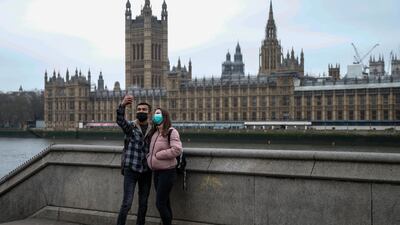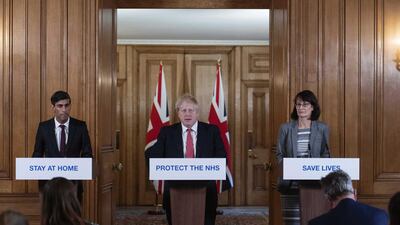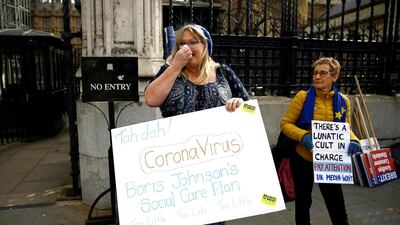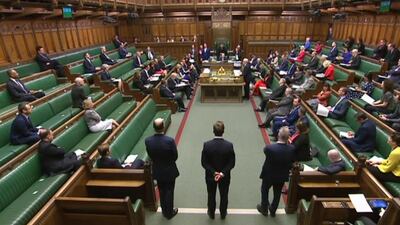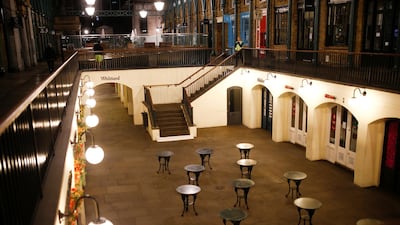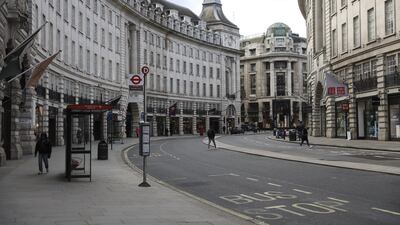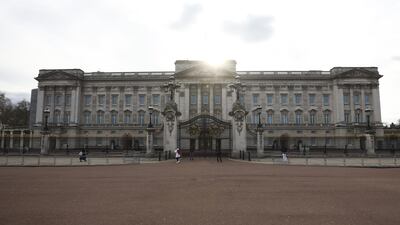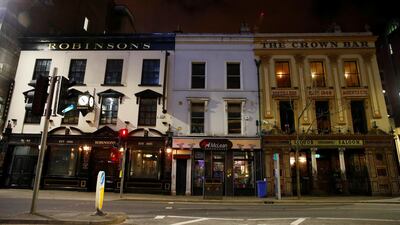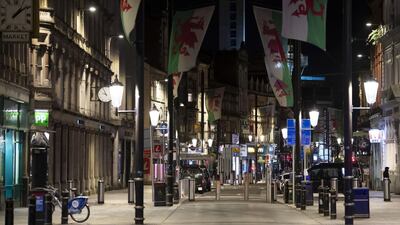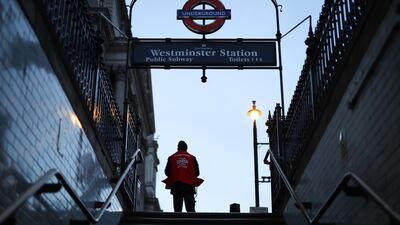There were only two flights listed on the departure board at John F Kennedy airport in New York the morning of Thursday, March 19: 09:05am to Heathrow, and 11:45am to Tokyo.
The British Airways plane was almost empty. And so was Heathrow. While the UAE was testing people for possible coronavirus infection on arrival, there were no such protocols in place in the UK. Within minutes of landing, I was in an Uber on my way home. The driver was grateful for business. His income, he told me, was declining by the day, sliding away to nothing.

After dropping my bags at home – and turning on the heating – I decided to go to my local Sainsbury’s to stock up on food. It was 9pm, and they were open for two more hours. I entered to find aisle after aisle of empty shelves.
Returning home disappointed, I went online to the Waitrose web page and filled my basket up. But when I went to check out, the earliest delivery date was in June. And when I went back later to see if an earlier slot had opened up, the whole site had crashed.
I tried Sainsbury’s again early the next morning. But the queue to get in was all the way down the street, with would-be customers bunched together. So instead I went to the local corner shop where I was able to buy soya milk and two onions. With some sense of urgency, I strode down to Clapham Junction. The shelves in Waitrose and Marks and Spencer were also empty. But in a small local whole foods store I was at last able to find some fruit and vegetables, and some protein in the form of plant-based mince. I now had enough food for three days - but certainly not enough to last through home quarantine if I fell ill from the virus.

The next day, I tried Sainsbury’s once more. This time I was able to find three oranges, two tins of tuna, and half a can of baked beans. When I came to the check-out, I was told that restrictions were now in place to stop panic-buying. I was only allowed to purchase two pieces of fruit and two tins. I had to return one of the oranges and the beans.
Earlier in the month, the UK government seemed to have charted a different response to the rest of the world, focusing on protecting the economy, rather than the lives of the elderly. Officials spoke of how “herd immunity” would be developed after 60 per cent or more of the population were infected and this would then prevent a second wave of the virus from taking hold. But that approach was soon rejected after modelling from Imperial College London showed that half-a-million Brits would die unless drastic action was taken to stop the spread of the disease.
On Monday evening, around 28 million people watched Prime Minister Boris Johnson tell the country that we are facing a “moment of national emergency” and announce a total lockdown. Shopping trips are to be as infrequent as possible – and only for basic necessities. We are only allowed out once a day on our own to exercise. All weddings and baptisms are banned. Only funerals are allowed – to be attended by immediate family. The National Health Service is already under great stress. I received a text from GOV.UK summarising the “new rules in force”: “Stay at home. Protect the NHS. Save lives.”
Up until now, I was someone who had taken travel for granted – teaching at Yale university, attending international conferences and cultivating a global network. Suddenly, the world has shrunk.
But that is not the only change taking place. I’m also connecting with my neighbours. I live on a street of two-bedroom Victorian maisonettes, with one house built on top of the other. I can easily hear those living either side of me, as well as those above. Most of the residents are tenants, and the turnover is constant. But now, we are all confined to our homes. While spending an afternoon in my backyard pulling up weeds and selecting a spot in which to grow tomatoes, I struck up a conversation with Sam, who rents the place above mine and was hanging out the window cleaning the panes.
Sam is a plumber, but his work is declining rapidly as people are too scared to let him enter their houses for fear of contagion. The government announced that it will pay 80 per cent of workers’ wages to prevent people being laid off in the hope that the economy will quickly recover once the crisis is over. But Sam does not know if he is included, or what forms he should fill out. He is also running short on provisions. He has pasta, which he is prepared to exchange for loo roll. A barter system is already coming into place.
Two leaflets are pushed through my door. One is from my local council promising “to protect and support everyone in our community, but particularly the most vulnerable” and explaining how it is mobilising volunteers to deliver food and prescriptions, provide transport, and walk dogs. And the other is from Julia and Ellen, who apparently live on the same street and are offering to help shop for anyone who is self-isolating.
I no longer wake up in the morning to the noise of planes overhead, but rather to the sound of birds. And while I still check in on friends all around the world to express solidarity, I am now firmly rooted in my London street along with Sam, Julia and Ellen, making forays outside to get food, waiting for the plague to pass and hoping that it will not strike us or those we love down. Britain’s death toll has passed 400. We are two weeks behind Italy.
Brexit ripped Britain apart. But perhaps the shared experience of surviving coronavirus will bring us back together.
Emma Sky is Director of Yale World Fellows and author of In a Time of Monsters: Travelling in a Middle East in Revolt
